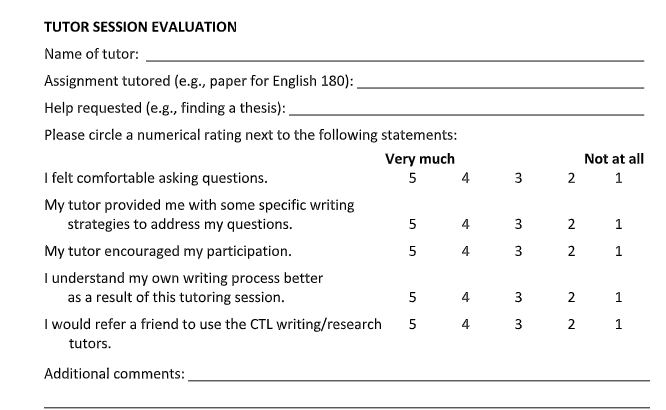by Jessica Barker
A few weeks ago, I had the privilege of attending the International Writing Centers Association conference (IWCA) in Atlanta, Georgia. The theme of this year’s conference was “The Citizenship Center.” Appropriately, most of the workshops and sessions during the conference focused on diversity within the writing center and English as a second language (ESL) students. I found a couple of these workshops particularly enriching.
One of these workshops, “Words Matter: Conveying Writing Centers’ Commitment to Social Justice through Student Satisfaction Questionnaires,” was presented by a student writing consultant from Iowa State University. The writing consultant began her presentation by introducing the feedback forms that students fill out following their consultant sessions. These forms essentially serve the same purpose as the forms that we use here at Principia (see below for the Principia version). They provide tutors with valuable feedback, which is then used to better both the tutor’s individual work and the work of the writing center/the Center for Teaching and Learning (CTL).
 Principia’s Current Evaluation Form
Principia’s Current Evaluation Form
After the consultant introduced the concept of Iowa State’s feedback forms, she explained that there was nothing inherently wrong with their current form, but she was curious about what could be done to improve it. Specifically, she wanted to know how she could alter the questions to improve the consultants’ feedback regarding diversity and the inclusion of all students. The consultant explained that she began this process by collecting the feedback provided by the original form and creating graphs. These graphs gave the consultants a general sense of the students’ feedback, but it did not give them any in-depth information , as most of the questions only had “yes” or “no” options. This was troubling to the consultant, so she changed the questions to the following:
- Check all that apply (with a list of different races/ethnicities, plus an “I’d rather not answer” option)
- Did your tutor listen attentively to your concerns? Please explain.
- Would you describe the writing center as a welcoming and inclusive space? Please explain.
- Your voice matters to us! How can we improve?
These new questions essentially touched on the same points as the original ones, except these new questions were a bit more nuanced. They prompted the students to respond thoughtfully rather than just asking them to circle “yes” or “no.” Also, they gave the consultants a better sense of who was attending the writing center and how welcomed those individuals felt. This information has helped the consultants reassess their approach and has inspired them to work towards creating an atmosphere where all students feel welcomed and supported.
After attending this presentation, I began to wonder whether we could implement similar changes to our feedback forms here at Prin. Since our campus has a fairly diverse student body, I think it is important for us to ensure that all students feel welcomed and supported by the peer tutors and by the CTL. However, I am left wondering whether or not these types of feedback questions would work for our community. Is it appropriate to ask about a student’s racial or ethnic identity on a tutor evaluation form? Would students want to take the time to fill out a more extensive form? Would these questions actually make tutees feel heard? If not, it would be interesting to explore other ways in which the tutors could gauge their overall impact. If you have any suggestions, comments, or general feedback about Principia’s approach to tutor evaluation/feedback forms, I would love to hear from you! Please contact me at jessica.barker@principia.edu or Ellen Sprague at ellen.sprague@principia.edu.
Jessica is a senior from Massachusetts who is studying theatre and sociology/anthropology.
